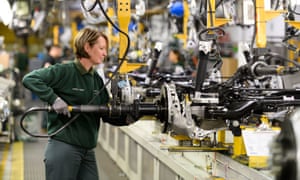Jobs safeguarded as carmaker aims ‘to create a powerhouse of electrification in the Midlands’

A worker at the Jaguar Land Rover site in Castle Bromwich, West Midlands. The car giant is to build a range of electric cars in the UK.
Photograph: Jaguar Land Rover/PA
Jaguar Land Rover will build an electric version of its Jaguar XJ saloon at its Castle Bromwich factory, in a boost to the embattled automotive industry.
Britain’s largest carmaker will invest hundreds of millions of pounds in the plant on the outskirts of Birmingham, safeguarding the jobs of 2,500 people.
The last of the current model of the XJ will roll off the lines on Friday before the company switches production to the new model over the summer. JLR, which is owned by India’s Tata, had previously pledged to create electric versions of all of its models by 2020.
Workers at the plant last month voted in favour of a four-day week amid a £2.5bn cost-cutting drive.
Ralf Speth, the chief executive of Jaguar Land Rover, said the company was locating electric vehicle manufacture, electronic drive units and battery assembly together near Coventry “to create a powerhouse of electrification in the Midlands”.
JLR has built a new battery assembly plant at Hams Hall, between Coventry and Birmingham, which will be capable of making 150,000 units a year – equivalent to a third of JLR’s 2018 output from the UK of 449,000 cars.
However, Hams Hall will import cells for its batteries from Asia, in the absence of a major British manufacturer. JLR on Friday called for the manufacture of a “gigafactory” in the UK to provide the large volumes of battery cells it will need for its cars.
Speth said: “Affordability will only be achieved if we make batteries here in the UK, close to vehicle production, to avoid the cost and safety risk of importing from abroad.
“The UK has the raw materials, scientific research in our universities and an existing supplier base to put the UK at the leading edge of mobility and job creation.”
The all-electric Jaguar XJ is not the first car powered solely by a battery that the carmaker has produced. However, its I-Pace SUV is manufactured in Austria by Magna Steyr, a contractor.
JLR has struggled in recent months. In common with other manufacturers with significant British operations, the company is desperate to avoid a no-deal Brexit, which would probably result in the imposition of tariffs on its imported components. At the same time, car sales in China – the key growth market for the global automotive industry – fell last year for the first time in nearly three decades.
JLR has been particularly hard hit by the Chinese slowdown. It was forced to take a £3.1bn accounting writedown in the last quarter of 2018 after admitting its investments in the region were worth much less than planned, resulting in its worst annual loss.